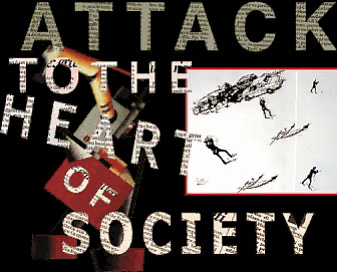I lived on the other side of the city centre, far away from the university, and used my scooter to get around. The city had been bristling with checkpoints for two months, but that morning I wasn't stopped once. As always, I took the street where the Communist Party had its offices, in a building diagonally across from the Christian Democrats. A huge crowd had gathered on the corner. I parked my Lambretta and went to have a look. They were standing around a red car with its trunk open. I asked a man what had happened. He said: they found Moro. I got back on my Lambretta and drove automatically to the university, but on the way I stopped. There was nothing there to do, so I decided to go back home. In a sense, I never got out again.
It started me thinking. Ever since, I've refused to speak for others. I quit seeing myself as a participant in a public cause. I kept participating in demonstrations, but no longer because I felt part of a community with whom I shared a responsibility. I participated because I identified with a particular demonstration, with a protest movement or because of a friendship.
My immense sorrow and that of so many people on the day of Aldo Moro's death, was apparently not only caused by the senseless murder of a human being; it was also the inglorious end of a utopia I'd believed in. I felt I'd been taken advantage of, shut up by precisely the people whose history bore a frightening resemblance to my own.
When almost all of Moro's kidnappers were arrested and we saw their faces, I realised that I'd had discussions with some of them, on the staircase of the literature faculty I attended every day. Now, I could interpret some of those phrases more accurately, as though I suddenly had a better grasp of the communist dialectics they had used.
Those dialectics, or a deviant, distorted branch of them, as some would have it, lead one to think using symbols. Time and time again, they create a contradictory symbol that results in a name or magic charm in the form of an abbreviation (for example, the famous s.i.m., the imperialist state of the multinationals, which I believe in fact somehow exists). This symbolic thinking is entirely focused on itself: it avoids contact with real people, real situations, with hopelessly stupid reality; but it certainly influences that reality. Alas, there's no denying that the Red Brigades were communist, and close cousins of Pol Pot, who I would not like to be governed by. For me, communism stopped existing in 1978, not in 1989.
It's entirely in tune with these dialectics that the body of Aldo Moro, the man who symbolised the rapprochement of communists and Christian democrats, was left in the neighbourhood of the two party headquarters. Everything is a sign, according to one ancient Greek, and a body can be denied the right to be nothing more than simply a corpse. In a messianic, optimistic vision of the world, such as that of communism, a dead body can become a symbol, a warning, a pointer in the direction of the future.
To erect a monument, according to Leopardi, one must be optimistic: only in this way can one receive a lesson and a future. And they did indeed erect one, on that spot pointed out by the catholic communists of the Red Brigades. They placed a beautiful, disproportionately large bronze plaque on the facade of a building near the spot where Moro was left; not in the garage where he died, in one of those dreary, petit-bourgeois neighbourhoods of which the real Rome consists.
To leave a human corpse in the beautiful centre of Rome, a city patrolled by police, army and forester guards, was seen as a heroic act. Such a gesture takes luck, which as we know, favours the brave. With the exception of the heroism of the Resistance in ww ii, the imagination of the Red Brigades' members of my generation, of my intellectual peers, was derived from comic book heroes. When they wrote messages employing pretty allegories, they didn't realise that they were almost literally quoting Tex Willer, our wild-west comic book hero. And the 'geometric' power of their deeds, so admired by Toni Negri, was nothing other than a subculture, just like my own subculture - one that was put into practice with an accountant mentality that I fortunately did not share.
To this very day, I'm reluctant to go to Rome. Almost every sidewalk and facade bears the traces of a decade of violence of which I was both an actor and a victim. Here a trace of old graffiti, or a spot where blood flowed; there a hole in a roll-down shutter, from a bullet aimed at my buttocks; there they lifted the lifeless body of a boy who passed a bank at the wrong moment. I find it difficult to feel any nostalgia or tenderness for Rome. And I can't comprehend the lyrical tone in the autobiographical work of Valerio Morucci, one of Moro's kidnappers, when he waxes eloquent about the city's charm and beauty during the years he 'worked' there. It's true, of course: Rome offers a splendid backdrop. But behind the bronze plaque, there's nothing.
Roma, 24-XII-2000
translation JAMES BOEKBINDER
